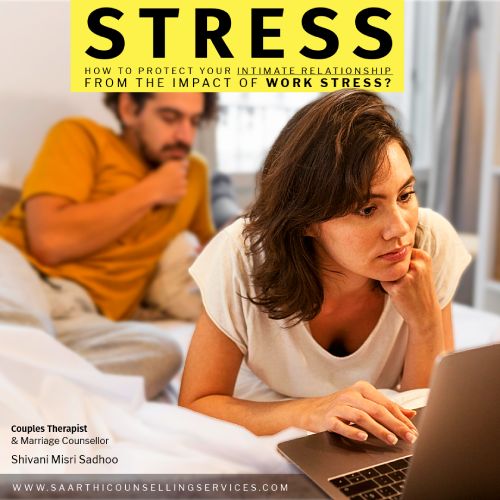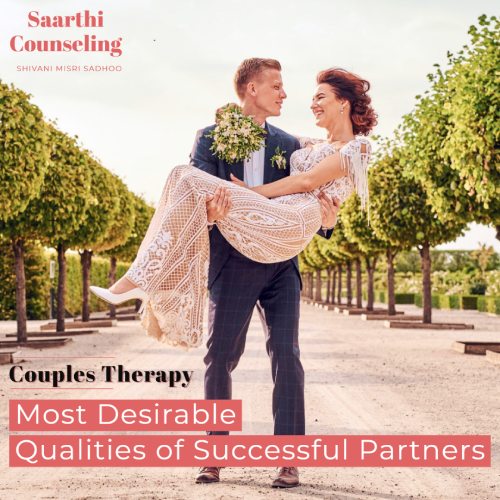In today’s busy and competitive world, where life revolves around the clock, maintaining a healthy relationship can definitely be challenging. Many of us must have experienced the suffocating grip of stress from work, feeling its corrosive effects on our relationships like a sour lemon in the face. However, amidst the chaos of deadlines, demanding colleagues, and relentless shift patterns, there exists a path to safeguarding our intimate connections. Let’s find out from relationship expert and eminent couples therapist Shivani Misri Sadhoo ways to protect your intimate relationship from the impact of work stress.
Stress is highly contagious. That’s why when you are feeling the stress, it is obvious that your partner too will feel it indirectly. Sometimes this becomes too intense and is called crossover workplace stress where partners share and amplify each other’s work stress, showing how emotional burdens transcend individual experiences, says leading couples therapist Shivani Misri Sadhoo in this blog.
What are some ways to protect your intimate relationship from the effects of work-related stress?
Shivani Sadhoo says the below-mentioned pointers will help you to manage your intimate relationship effectively.
Identify the stress first – Recognizing your partner’s stress signals is crucial for maintaining a strong connection. It allows you to understand their struggles and provide much-needed support. Changes in sleep, eating habits, mood, or energy levels are key indicators.
Since women may display stress differently than men, attentive observation becomes even more vital. By acknowledging their stress, you open avenues for support, fostering resilience and strengthening your bond.
Separate our professional life from personal life – While it may be quite difficult to disconnect yourself from work in this hyperconnected world, it’s crucial to establish clear boundaries between your professional and personal life. Designate specific areas at home as work-free zones like the bedroom or yard.
Also, schedule work-free times during the day with regular breaks and a fixed end time in the evening. This proactive approach enables couples to support each other’s emotional needs without sacrificing their own well-being, ultimately nurturing a healthier and more resilient bond.
Communicate – Effective communication is vital in nurturing intimate relationships. By openly discussing work stress with your partner, you cultivate understanding and patience, preventing misunderstandings. Sharing concerns and supporting each other builds teamwork and unity.
Establishing a safe environment for expressing emotions strengthens intimacy. Regular check-ins enable honest conversations about challenges, nurturing a deeper connection. This mutual sharing of burdens and vulnerabilities creates a strong foundation for intimacy to flourish.
The right choice of words – Choose your words carefully, for they are the bridge between hearts in times of relationship stress. When emotions run high, allowing your partner to express themselves without judgment fosters understanding. Accusations, exaggerations, or insincere compliments only deepen wounds.
Engage in discussions with empathy, avoiding defensiveness, to navigate stress as a team. Equally crucial is monitoring your tone; its pitch, volume, and pace convey more than words alone, shaping the emotional landscape of communication.
Offer help/support – Supporting your partner during times of stress is crucial for maintaining a healthy relationship. By sharing your feelings with trusted individuals, such as friends or therapists, you can alleviate the emotional burden on your partner.
Understanding their needs and communicating yours nurtures mutual support and prevents resentment. Listening without judgment cultivates compassion and strengthens the bond, aiding in healing past wounds and building a resilient partnership.
Look after yourself – Taking time apart from your partner, even amidst isolation, is crucial for self-care and a healthy relationship. Whether it’s a brief solo walk, separate workspaces, or pursuing individual interests, this distance allows for recharge and alleviates shared stress.
It fosters independence, preventing mutual overwhelm, and nurturing fondness through the adage, “absence makes the heart grow fonder.” Stress and strain are unavoidable companions in our modern lives, often infiltrating our intimate relationships. However, by recognizing and addressing the impact of work stress, couples can fortify their bond.
Through effective communication, setting boundaries, and offering support, partners can navigate the tumultuous waters together. By prioritizing understanding, empathy, and self-care, they forge a path toward resilience and deeper intimacy, safeguarding their relationship amidst life’s chaos.










